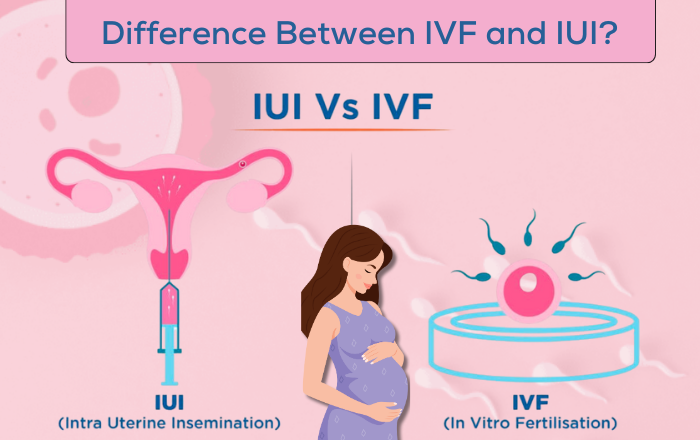Starting a family is a beautiful journey, but for some couples, it may take a little extra help. If you’re exploring fertility treatments, you’ve probably come across IVF (In Vitro Fertilization) and IUI (Intrauterine Insemination). Both are common treatments for infertility, but they work in different ways.
Many couples ask, “What’s the difference between IVF and IUI, and which one is right for me?” Understanding how these treatments work, their success rates, and costs can help you make an informed decision. In this article, we’ll break down both procedures in simple terms, so you know what to expect.
What is IVF (In Vitro Fertilization)?
IVF is a process where eggs and sperm are combined outside the body in a laboratory. Once an embryo forms, it is transferred into the woman’s uterus. This method is used when natural conception or simpler treatments like IUI don’t work.
Step-by-Step IVF Process:
Ovarian Stimulation: Medications are given to stimulate the ovaries to produce multiple eggs.
- Egg Retrieval: A minor procedure is done to collect eggs from the ovaries.
- Fertilization in the Lab: The eggs are combined with sperm in a lab to form embryos.
- Embryo Transfer: A healthy embryo is placed into the uterus for implantation.
Who Can Benefit from IVF?
- Women with blocked or damaged fallopian tubes
- Couples dealing with male infertility issues (low sperm count or poor sperm quality)
- Women with PCOS or irregular ovulation
- Cases of unexplained infertility where other treatments have failed
IVF Success Rates
IVF success depends on factors like age, health, and fertility history. On average:
- Women under 35 have a 40-50% success rate per cycle.
- Women over 40 may have a 10-20% success rate.
What is IUI (Intrauterine Insemination)?
IUI is a fertility treatment where sperm is directly placed inside the uterus to improve the chances of fertilization. This process is less complex than IVF and is often the first treatment option for many couples.
Step-by-Step IUI Process:
Ovulation Tracking: The doctor monitors ovulation through ultrasound or hormone tests.
Sperm Preparation: The best-quality sperm is separated from the sample.
Insemination: A thin tube is used to place the sperm directly into the uterus.
Who Can Benefit from IUI?
- Couples with mild male infertility (low sperm count or motility)
- Women with regular ovulation but unexplained infertility
- Women using donor sperm for conception
IUI Success Rates
- 10-20% success rate per cycle (varies by age and condition)
- Couples may need 3-6 cycles of IUI before considering IVF
Key Differences Between IVF and IUI
| Factor | IVF | IUI |
|---|---|---|
| Procedure | Eggs are retrieved and fertilized in a lab before transfer. | Sperm is directly placed in the uterus. |
| Cost | Higher due to lab work and medication. | More affordable. |
| Success Rate | Higher, especially for complex infertility cases. | Lower but effective for mild cases. |
| Time Required | 4-6 weeks per cycle. | 2-3 weeks per cycle. |
| Best For | Severe infertility, blocked tubes, low sperm count. | Unexplained infertility, mild male infertility. |
Which Treatment is Right for You?
The choice between IVF and IUI depends on several factors:
✔ Your age – IVF works better for women over 35.
✔ Infertility cause – IVF is better for blocked tubes or severe male infertility.
✔ Budget – IUI is more affordable but may require multiple cycles.
✔ Doctor’s recommendation – A fertility specialist can guide you based on your medical history.
Some couples start with IUI and switch to IVF if they don’t get pregnant after multiple attempts. A consultation with a fertility doctor can help determine the best path for you.
Cost Comparison: IVF vs IUI in India
- IUI Cost in India: ₹10,000 – ₹25,000 per cycle
- IVF Cost in India: ₹1,00,000 – ₹2,50,000 per cycle (varies by clinic and medications)
Since IVF requires lab procedures and more medication, it is more expensive. However, it offers a higher success rate than IUI.
Consult a Fertility Specialist – Dr. Sonal Katarmal in Ambegaon Budruk
If you’re unsure whether IVF or IUI is right for you, it’s best to consult a qualified doctor. Dr. Sonal Katarmal in Ambegaon Budruk has helped many couples overcome infertility and start their families.
Book a consultation today and take the first step toward parenthood!
FAQs (Frequently Asked Questions)
1. Is IVF or IUI more successful?
IVF has a higher success rate, especially for women over 35 or couples with fertility issues. IUI works better for mild infertility cases.
2. How many IUI cycles should I try before considering IVF?
Doctors often recommend 3-6 cycles of IUI before switching to IVF.
3. What lifestyle changes can improve success rates of IVF and IUI?
- Maintain a healthy weight
- Reduce stress levels
- Avoid smoking and alcohol
- Follow a balanced diet
Both IVF and IUI help couples struggling with infertility, but the right choice depends on your situation. If you’re looking for guidance, Dr. Sonal Katarmal in Ambegaon Budruk can help you understand your options.
Still have questions? Contact Dr. Sonal Katarmal at Femcare Clinic and take the next step toward parenthood!

